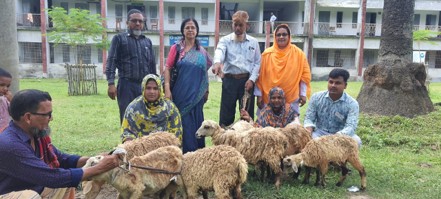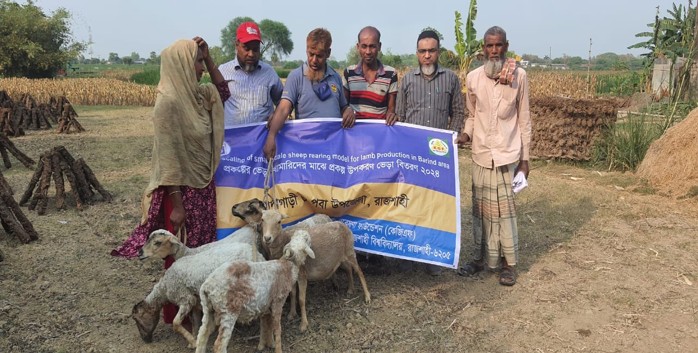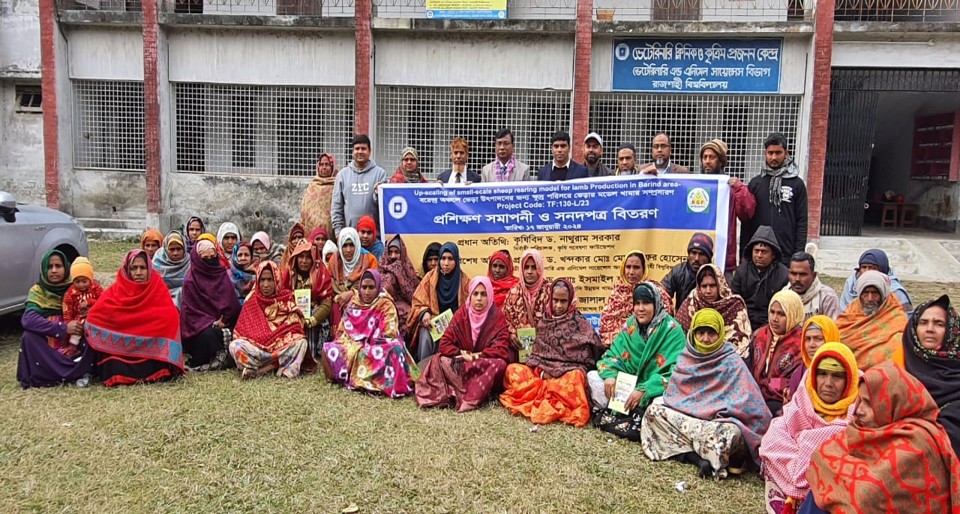Up-scaling of small-scale sheep rearing model for lamb production in Barind area
Sheep is used for meat, milk and wool worldwide but only for mutton in Bangladesh. Sheep are indigenous type but very prolific. It is an important source of income for the sheep farmers involving minimum investment, care and management. The sheep is neglected species in Bangladesh but its meat value is superior to other animals. The Barind region has a high concentration of indigenous sheep, known for resilience but low productivity. Despite superior meat quality, sheep rearing remains neglected due to unawareness. This project aims to enhance production through improved management, breeding, and awareness programs.
The project was conducted at Paba and Gadagari upazilla under Rajshai district. A total of 40 sheep farmers were selected based on prior sheep-rearing experience, economic status, and interest. Beneficiaries received training, five adult sheep (4 ewes + 1 ram), feed in scarcity, participatory housing, and veterinary support. Public awareness were raised through social media and yard meetings. Data on inputs, outputs, and income were recorded for cost-benefit analysis to assess project impact.
The project successfully scaled up small-scale sheep rearing in the Barind area through 4 FGDs and surveys, 40 committed farmers were selected, and two-days training program was conducted to increase farmers technical knowledge on sheep keeping and marketing.
The project successfully scaled up small-scale sheep rearing in the Barind area through 4 FGDs and surveys, 40 committed farmers were selected, and two-days training program was conducted to increase farmers technical knowledge on sheep keeping and marketing.
The project significantly improved farmers' capacity, productivity, and market access in the Barind region. Increased Farmers’ Capability: • 100% of selected farmers (40) received training, improving their technical skills in sheep rearing. • Scientific management practices led to an 88.5% increase in sheep population (from 200 to 377). Market Linkages: • Farmers linked direct connections with local traders, meat processors, and consumers. • Dependence on intermediaries reduced, ensuring fairer prices and stable demand. • Initial sales data indicate a 15-20% increase in farmers’ earnings. Value Chain Development: • The project strengthened local supply chains by linking farmers with markets. • Partnerships with traders and consumers created a structured value chain for sustainable sheep farming. • The model provides a scalable framework for further expansion.
The project is designed for long-term sustainability through institutional support, market integration, and community-based replication. 1. Institutional Support • Krishi Gobeshona Foundation (KGF) and Rajshahi University provide ongoing technical advisory services and awareness programs to support farmers in scientific sheep management. • Advocacy efforts focus on lamb meat benefits, improving consumer demand, and policy integration with government livestock programs. 2. Market Linkages • The formation of Sheep Rearer Association in Rajshahi strengthens collective bargaining power and ensures fair market access. • Direct connections with local traders, processors, and consumers stabilize pricing, reducing dependency on intermediaries. • Partnerships with meat processors and retailers create a structured value chain for sustainable market-driven production.



